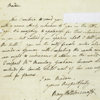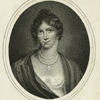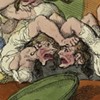Female Patriots
 Mary
Wollstonecraft's
Mary
Wollstonecraft's
letter to
Catharine
Macaulay, 1790
NYPL,
Pforzheimer
Collection
 Helen Maria
Helen Maria
Williams
NYPL,
Pforzheimer
Collection
More than any other event in this period, the French Revolution
changed lives. Its early political reforms—the abolition
of the monarchy, the expansion of civil liberties, the limitation
of Church power—improved life for millions of French citizens
(no longer subjects), and encouraged hopes across Europe that
life might be more equitably arranged. Many Britons reacted with
joy to the first news of the Revolution, but this early, hopeful
phase did not last long. In particular, the guillotines’ hackwork
during the Terror of 1793 changed the minds of many former supporters
of the Revolution. Britain’s wars with France began in 1793
and continued until Napoleon’s final defeat in 1815.
 Breaking Up of
the
Breaking Up of
the
Blue
Stocking Club
NYPL,
Pforzheimer
Collection
Revolutions arouse strong emotions, and this section features
women who participated in the heated discussions that took
place all over Britain after 1789. In pamphlets, novels, poetry,
and
images, people asked questions: Should women have the same
rights as men? Did people have rights or duties, and were they
citizens
or subjects? Of what use was the nobility, anyway? Was human
nature mutable? Would all this lead to mob rule? If all men were
created
equal, how could the slave trade be justified? Answers to these
questions and others ensured that printers were kept busy,
despite some episodes of governmental censorship. Although women,
even
the most conservative, were not welcome in the discussion,
enter it they did, and some of the struggles of these years may
be followed
here.



